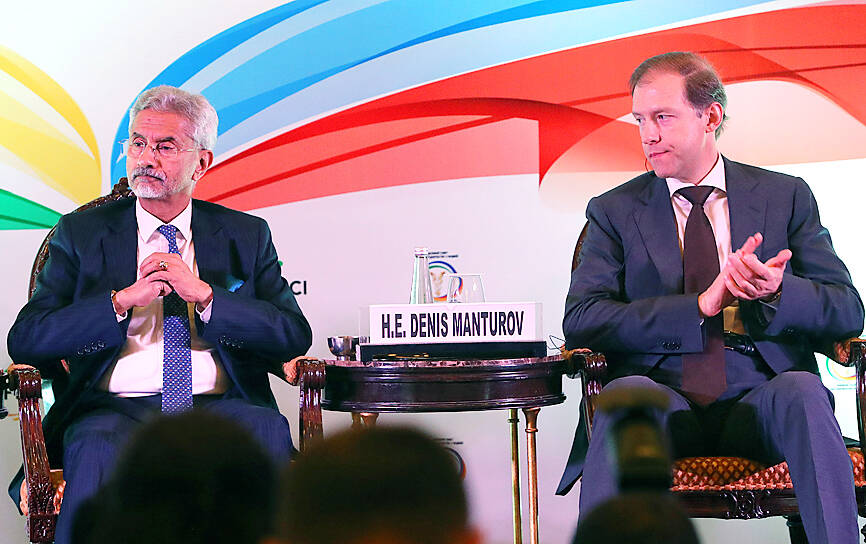India and Russia are discussing a free trade agreement, ministers said yesterday, a move that would further deepen bilateral commercial ties that have flourished since Moscow’s invasion of Ukraine.
Indian Minister of External Affairs Subrahmanyam Jaishankar told an event in New Delhi that his government was in “advance agreement” on a trade treaty that Russian Minister of Trade and Industry Denis Manturov said would bring a guarantee of bilateral investment.
India has not explicitly criticized Russia’s invasion of Ukraine — which Moscow describes as a “special military operation” — and has called for a peaceful resolution of the conflict through dialogue.

Photo: EPA-EFE
Russia, a traditional defense equipment supplier, also displaced Iraq last month to become India’s top supplier of crude oil. Overall Indian imports from Russia increased almost fourfold to US$46.33 billion in the year to March 31.
Moscow was looking to increase machinery imports from India to improve the trade balance, Manturov said.
“We need to find a niche in the products which India can replace,” he told reporters on the sidelines of the event. “In civilian projects, we need as wide cooperation as it was before the sanctions.”
Reuters reported in November last year that Russia was potentially seeking to import more than 500 products from India for key sectors including automobiles, aircraft and trains, as Western sanctions undermine Moscow’s ability to keep core industries operating.
India also aims to narrow its growing trade deficit with Russia, which has been India’s largest supplier of military equipment for decades and is the fourth-biggest market for Indian pharmaceuticals.
Jaishankar said that Indian business could benefit from Russian technology and that New Delhi was working to iron out payments, certification and logistics issues.

TAKING STOCK: A Taiwanese cookware firm in Vietnam urged customers to assess inventory or place orders early so shipments can reach the US while tariffs are paused Taiwanese businesses in Vietnam are exploring alternatives after the White House imposed a 46 percent import duty on Vietnamese goods, following US President Donald Trump’s announcement of “reciprocal” tariffs on the US’ trading partners. Lo Shih-liang (羅世良), chairman of Brico Industry Co (裕茂工業), a Taiwanese company that manufactures cast iron cookware and stove components in Vietnam, said that more than 40 percent of his business was tied to the US market, describing the constant US policy shifts as an emotional roller coaster. “I work during the day and stay up all night watching the news. I’ve been following US news until 3am

UNCERTAINTY: Innolux activated a stringent supply chain management mechanism, as it did during the COVID-19 pandemic, to ensure optimal inventory levels for customers Flat-panel display makers AUO Corp (友達) and Innolux Corp (群創) yesterday said that about 12 to 20 percent of their display business is at risk of potential US tariffs and that they would relocate production or shipment destinations to mitigate the levies’ effects. US tariffs would have a direct impact of US$200 million on AUO’s revenue, company chairman Paul Peng (彭雙浪) told reporters on the sidelines of the Touch Taiwan trade show in Taipei yesterday. That would make up about 12 percent of the company’s overall revenue. To cope with the tariff uncertainty, AUO plans to allocate its production to manufacturing facilities in

Six years ago, LVMH’s billionaire CEO Bernard Arnault and US President Donald Trump cut the blue ribbon on a factory in rural Texas that would make designer handbags for Louis Vuitton, one of the world’s best-known luxury brands. However, since the high-profile opening, the factory has faced a host of problems limiting production, 11 former Louis Vuitton employees said. The site has consistently ranked among the worst-performing for Louis Vuitton globally, “significantly” underperforming other facilities, said three former Louis Vuitton workers and a senior industry source, who cited internal rankings shared with staff. The plant’s problems — which have not

COLLABORATION: Given Taiwan’s key position in global supply chains, the US firm is discussing strategies with local partners and clients to deal with global uncertainties Advanced Micro Devices Inc (AMD) yesterday said it is meeting with local ecosystem partners, including Taiwan Semiconductor Manufacturing Co (TSMC, 台積電), to discuss strategies, including long-term manufacturing, to navigate uncertainties such as US tariffs, as Taiwan occupies an important position in global supply chains. AMD chief executive officer Lisa Su (蘇姿丰) told reporters that Taiwan is an important part of the chip designer’s ecosystem and she is discussing with partners and customers in Taiwan to forge strong collaborations on different areas during this critical period. AMD has just become the first artificial-intelligence (AI) server chip customer of TSMC to utilize its advanced